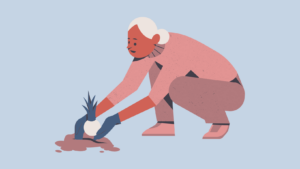In brief
Days after the Prime Minister launched a bold new Civil Society Compact, the Health secretary announced a major public consultation on the future of the NHS and the Chancellor introduced a budget that squeezed frontline services in the short term, invested in the longer term and offered some sparkles in the small print. In this two-part blog series, we explore how a greater focus on relationships can – and must – guide the way ahead.
In part one of the series, David Robinson argues that good relationships and effective relational practice must, now more than ever, head the policy agenda. Here, in part 2, Rosa Friend draws encouragement, and practical examples, from the work of local authorities and their communities in the dark days of lockdown.

The Chancellor’s budget, a new Civil Society Covenant, and a public consultation on the future of the NHS have all been announced in recent weeks. As David Robinson sets out here, good relationships and effective relational practice must, now more than ever, head this policy agenda.
But in an environment where local authorities and community organisations are often working hard to stay financially afloat, and in a landscape where many initiatives that focused on prevention and good relationships have been casualties of austerity, what could a relationships first approach look like in practical terms?
The citizens, community groups, charities, funders and local authorities who nimbly adapted to connect and support people during the dark days of the Covid lockdowns have already shown us. At the time, inspired by what we’d seen (and heard – from young people through The Lookout, and from communities across the UK through the Relationships Observatory), The Relationships Project shared suggestions for how local authorities could sustain and enhance the networks of support that had emerged during the crisis. These ideas weren’t prohibitively expensive – some would cost nothing to implement – and in many cases, they were already happening in different parts of the country.
We’re resharing these practical ideas for local authorities here, because they feel just as necessary now; perhaps more so.

Trust the community and adopt a Community Power of Competence
Often, public spaces and resources are underutilised. Councils strongly welcomed the General Power of Competence legislation in 2011, giving councils the ability to do anything, as long as it was not proscribed in law. A Community Power of Competence could give residents the right to use public space and resources to undertake the activities they want, unless councils can reasonably demonstrate why they shouldn’t. For example, if you wanted to close your road to hold a street party, you would inform the council and your neighbours and go ahead. At present you apply for permission, pay, and wait. What new possibilities might this approach open up?

Establish a community easement function
Energy is often wasted in the navigation of public bodies, but the blockages – a challenge getting hold of the right person, for example – may not be easily visible to a council. What if there was a mechanism for locating and resolving the obstacles that get in the way of community members connecting with and supporting one another? Examples of a more enabling approach might include the sharing of data and information, or proportionate requirements in the use of GDPR or DBS checks. How can we keep people and their information safe while removing red tape?

Restore community hubs
Most councils established community hubs during the first lockdown, where various parts of the public sector, community sector and volunteers came together under one (sometimes virtual) roof. This seemed to engender a culture of collectively addressing a problem with whoever was the best placed to help. The question became ‘What does this person need?’ instead of ‘Who does this problem belong to?’ Were community hubs, like this one in Hertfordshire, established in your area? Were they successful?

Procurement processes fit for local community providers
Typically, public sector procurement rules make it difficult for smaller community and third-sector organisations to bid and win contracts. During the Covid crisis, procurement of services and the use of public money was more flexible. There were issues, as the recent appointment of the Covid Corruption Commissioner, tasked with recouping money lost to contract fraud, makes clear. But when managed responsibly, simpler procurement processes that are accessible for smaller organisations bring many benefits. Spending budgets on local community providers of services – from care to catering – keeps money in the local economy, means less is extracted as profit and strengthens the capacity and capability of community organisations. What can we put in place so that procurement processes are accessible for smaller community organisations, but thorough enough that they avoid waste, bias and conflicts of interest?

Recognise relationships between citizens are our greatest natural resource
Relationships should be at the centre of public policy and practice, designed in rather than, as too often now, designed out. More should be done to recognise the link between reducing isolation and fewer hospital admissions, reduced social-care requirements and lower costs for the NHS and employers. Putting relationships first leads to better outcomes: check out the evidence in the Case Maker.
Do any of these ideas resonate with you? What could local or national governments put in place (or remove) to support your relationship-centred practice and the communities around you? We’d love to hear from you. And for more connection-focussed ideas from the States, take a look at Connective Tissue’s Framework.

Acknowledge that sustaining good relationships is a craft
While we all know meaningful relationships when we feel them, building and nurturing relationships is a skill that, like any other, can be taught and learnt and gets better with practice. Lifelong training as a community connector, organiser or mediator should be as widely available and as commonly accessed as first aid training. Everyone working for local authorities who interacts with community members – whether in housing management or parks – should be trained to integrate a relationship building approach into their day to day work. In other words, let’s utilise every touch point.
We’re currently developing plans for a Relationships Academy, to equip and empower people from different sectors and specialisms in Relationship-Centred Practice. Sign up to our newsletter to keep up to date with our Academy plans; as well as the progress of our Pattern Library, which will help relationship-centred practitioners to learn from one another’s hard-earned wisdom, and navigate common questions and challenges that arise when working relationally.

Read part 1
In the first part of this blog series, David Robinson argues that good relationships and effective relational practice must, now more than ever, head the policy agenda.
Do any of these ideas resonate with you? What could local or national governments put in place (or remove) to support your relationship-centred practice and the communities around you? We’d love to hear from you. And for more connection-focussed ideas from the States, take a look at Connective Tissue’s Framework.
Kit for Councils
What did we learn during the Covid-19 pandemic about the appropriate statecraft, in style and substance, for enabling strong and connected communities? The Kit for Councils shares principles, real-life case studies and a practical exercise.
